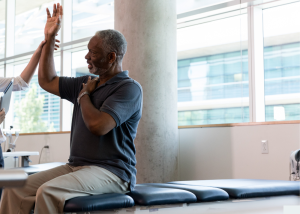
A patient’s injury, treatment goals, medical history, preferences, and age all affect their shoulder pain treatment. Your doctor will carefully evaluate each aspect when determining what treatment plan will be most effective for your specific shoulder pain. Your personalized treatment plan from OrthoKnox in Knoxville, TN orthopedic clinic will include the following age-related considerations to ensure you are receiving the best care possible for your shoulder pain.
What are some aspects of shoulder pain that are different depending on the patient’s age?
-
Cause of shoulder pain
Shoulder pain can be due to frozen shoulder, damaged tendons, rotator cuff tears, shoulder impingements, osteoporosis, or fractures.
While any injury can happen at any age, some injuries are more common for older or younger patients. Older patients have a higher risk of osteoarthritis, which is the gradual wear and tear of cartilage in the joints, as well as a higher risk of rotator cuff tears. Younger patients are more prone to sports-related or overuse injuries.
-
Treatment goals for shoulder pain
Treatment may focus more on returning to sports or intense activities or preventing long-term complications for younger patients, while the main goal for older patients may be daily functioning and pain management. The management of age-related changes may also direct treatment for older patients.
-
Treatment type: conservative and surgical treatments for shoulder pain
Older patients tend to prefer conservative treatments, and younger patients typically qualify and choose surgical treatment more often than older patients. However treatment is specific to each patient’s injury, pain level, and goals, regardless of age.
- RICE (rest, ice, compression, and elevation): This is generally the first step to try if you have shoulder pain.
- Physical therapy: A physical therapist will work with all patients to strengthen their shoulder, improve their range of motion, and increase their flexibility. Shoulder movement goals may vary with age. The intensity and progress of physical therapy exercises may be increased with younger patients but ultimately depends on each patient’s ability to tolerate movements.
- Medications: Nonsteroidal anti-inflammatory medications can help with shoulder pain. The dosage and type of medication may vary with age, as some adverse side effects can increase with age.
- Surgery: Some injuries and damage to the shoulder, including severe rotator cuff tears, shoulder impingements, and cases of osteoarthritis, benefit most from surgery.
-
Recovery time
Depending on the injury, younger patients tend to recover faster than older patients. This is due to fewer overall health issues and typically increased fitness levels, but it definitely varies from patient to patient.
-
Lifestyle modifications
Changes in sport intensity or posture are common recommendations for younger patients to prevent future injuries, while minimizing movements and reducing activities to reduce shoulder joint strain may be more beneficial for older patients.
Where do I go if I have shoulder pain?
If you have shoulder pain that will not subside, then we can treat you at ORTHOKnox orthopedic clinics, regardless of your age. We are located in Knoxville, TN. For more information about how the board-certified surgeon, sports medicine team, or physical therapists at ORTHOKnox can treat your shoulder pain, call (865) 251-3030, or fill out our easy-to-use online appointment request form. We look forward to hearing from you!
